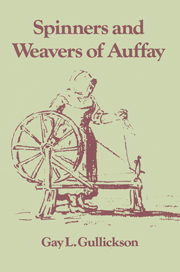 The Spinners and Weavers of Auffay
The Spinners and Weavers of Auffay Book contents
- Frontmatter
- Contents
- Preface
- 1 Introduction
- 2 The pays and the village
- 3 Proto-industrial theory and the pays de Caux
- 4 The golden age of spinning
- 5 Crisis and change in the Caux
- 6 The golden age of cottage weaving
- 7 Marriage and family in proto-industrial Auffay
- 8 Widowhood, remarriage, and the sexual division of labor
- 9 Unwed mothers and their children
- 10 Conclusions: the causes and consequences of proto-industrialization
- Appendix Vital statistics for Auffay
- Notes
- Bibliography
- Index
3 - Proto-industrial theory and the pays de Caux
Published online by Cambridge University Press: 29 October 2009
- Frontmatter
- Contents
- Preface
- 1 Introduction
- 2 The pays and the village
- 3 Proto-industrial theory and the pays de Caux
- 4 The golden age of spinning
- 5 Crisis and change in the Caux
- 6 The golden age of cottage weaving
- 7 Marriage and family in proto-industrial Auffay
- 8 Widowhood, remarriage, and the sexual division of labor
- 9 Unwed mothers and their children
- 10 Conclusions: the causes and consequences of proto-industrialization
- Appendix Vital statistics for Auffay
- Notes
- Bibliography
- Index
Summary
In 1971, Charles and Richard Tilly identified three processes they thought deserved further investigation by European economic historians in the decade of the seventies. The first was “industrialization before the factory system, or protoindustrialization.” They had adopted the term protoindustrialization from Franklin Mendels's dissertation, “Industrialization and Population Pressure in 18th-Century Flanders.” The term had been used before, most notably by E. J. T. Collins, E. L. Jones, and S. J. Woolf in analyzing the interplay between labor supply and agricultural advance in the eighteenth and nineteenth centuries, but Mendels was the first to define it systematically and to suggest that it should be viewed as a stage in the industrialization process.
In 1972, Mendels's first published work on proto-industrialization appeared. In it, he described proto-industrialization as “the rapid growth of traditionally organized but market-oriented, principally rural industry,” accompanied by regional specialization in agriculture and paving the way for industrialization proper (factory production of goods for national and international markets) by creating “capital accumulation, market connections, entrepreneurial skills, and agricultural progress,” and he analyzed its demographic effects in Flanders. Mendels's work captured the attention of economic historians and touched off what the Tillys had called for — an investigation of industrialization before the introduction of the factory system.
- Type
- Chapter
- Information
- The Spinners and Weavers of AuffayRural Industry and the Sexual Division of Labor in a French Village, pp. 38 - 67Publisher: Cambridge University PressPrint publication year: 1986


